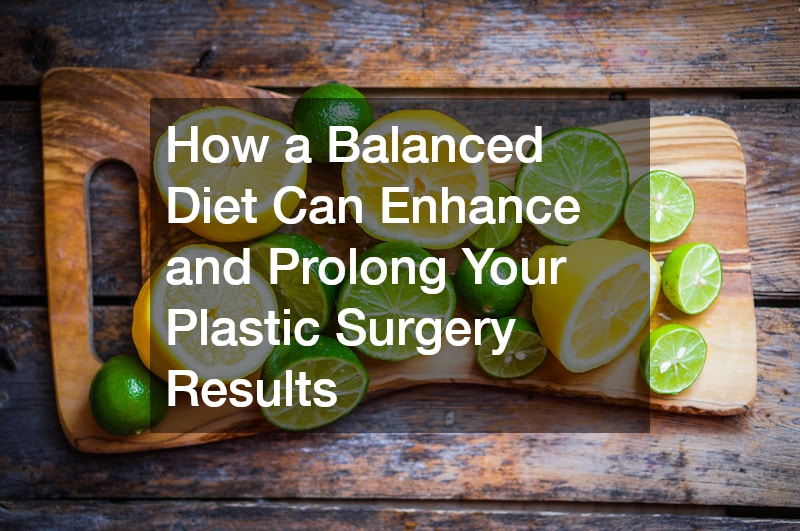Plastic surgery is a powerful tool for enhancing appearance, boosting confidence, and achieving long-lasting aesthetic goals. Whether it’s a facelift, tummy tuck, liposuction, or breast augmentation, these procedures rely not only on the surgeon’s skill but also on your body’s ability to heal and maintain results. One often overlooked factor in this process is nutrition. A balanced diet can significantly impact recovery, reduce complications, and help prolong the results of your procedure. Let’s explore the science behind nutrition and healing, outline key foods and nutrients to include in your diet, and explain how eating well can help you maximize the benefits of plastic surgery.
Why Nutrition Matters After Plastic Surgery
Every surgical procedure places stress on the body. Incisions, tissue manipulation, and anesthesia trigger an inflammatory response, requiring the body to repair itself efficiently.
Proper nutrition provides the building blocks your body needs to heal faster, minimize swelling, and maintain skin elasticity.
A diet rich in vitamins, minerals, protein, and healthy fats promotes collagen production, supports tissue repair, and strengthens the immune system. Conversely, a poor diet lacking essential nutrients can slow recovery, increase inflammation, and even affect the longevity of your results.
Key Nutrients for Recovery and Long-Lasting Results
1. Protein
Protein is the cornerstone of recovery. It is essential for rebuilding tissues, producing collagen, and maintaining muscle mass, which is particularly important after body contouring procedures.
Sources: Lean meats, poultry, fish, eggs, dairy products, tofu, legumes, and nuts.
Patients are often advised to increase protein intake in the days and weeks following surgery to ensure optimal healing and reduce the risk of complications such as wound breakdown or delayed tissue repair.
2. Vitamins and Antioxidants
Vitamins play a critical role in skin health and tissue repair.
-
Vitamin C: Essential for collagen synthesis, helps with wound healing and minimizes scarring. Found in citrus fruits, strawberries, bell peppers, and broccoli.
-
Vitamin A: Supports cell growth and skin repair. Found in sweet potatoes, carrots, and leafy greens.
-
Vitamin E: Helps reduce oxidative stress and supports skin regeneration. Found in almonds, spinach, and sunflower seeds.
-
Zinc: Important for immune function and tissue repair. Found in meat, shellfish, legumes, and seeds.
Antioxidant-rich foods help combat inflammation and oxidative stress caused by surgery, reducing bruising and promoting faster recovery.
3. Healthy Fats
Healthy fats are vital for hormone balance, inflammation reduction, and skin health. They also assist in the absorption of fat-soluble vitamins (A, D, E, and K), which are critical for recovery.
Sources: Avocados, olive oil, fatty fish (salmon, mackerel), nuts, and seeds.
Incorporating omega-3 fatty acids can help reduce post-surgical inflammation and swelling, supporting a smoother healing process.
4. Hydration
Water is essential for every cellular function, including healing. Staying hydrated improves circulation, helps flush out toxins, reduces swelling, and maintains skin elasticity.
Tip: Aim for at least 8–10 glasses of water per day, more if your surgeon recommends it. Herbal teas and water-rich fruits and vegetables can also help maintain hydration levels.

Foods to Avoid After Surgery
Just as certain nutrients enhance recovery, some foods can hinder the healing process. Limiting these can help you achieve better results:
-
Excess sugar: Can increase inflammation and slow tissue repair.
-
Processed foods and refined carbs: Often high in sodium and preservatives, which may worsen swelling and fluid retention.
-
Alcohol: Interferes with medications, increases bleeding risk, and dehydrates the body.
-
High-sodium foods: Can exacerbate swelling and fluid retention, slowing recovery.
Maintaining a clean, nutrient-dense diet allows your body to focus on healing rather than processing harmful substances.
How Nutrition Enhances Longevity of Your Results
Plastic surgery is not a substitute for a healthy lifestyle. While surgery can reshape or tighten areas of the body, maintaining those results over time requires consistent care—particularly when it comes to diet.
A balanced diet helps in several ways:
-
Maintains Weight Stability: Weight fluctuations after procedures like tummy tucks or liposuction can affect contouring results. Balanced eating helps keep weight stable, preserving the shape achieved through surgery.
-
Supports Skin Elasticity: Nutrient-rich foods maintain collagen and elastin production, keeping skin firm and smooth. This is especially important after procedures that remove excess skin.
-
Reduces Inflammation: Chronic inflammation can compromise healing and affect the appearance of scars or results. A diet high in fruits, vegetables, and healthy fats mitigates inflammation.
-
Promotes Muscle Maintenance: Protein and healthy fats support muscle integrity, which is critical after body contouring procedures to maintain tone and shape.
By prioritizing nutrition, patients not only recover faster but also enjoy longer-lasting aesthetic results.
Practical Tips for Maintaining a Healthy Diet
-
Plan Ahead: Stock your kitchen with fresh, whole foods before surgery. Pre-prepared meals can make eating nutrient-rich food easier during early recovery.
-
Small, Frequent Meals: Healing can increase energy demands. Eating smaller, nutrient-dense meals throughout the day can help meet these needs.
-
Include a Variety of Colors: Fruits and vegetables of different colors provide diverse antioxidants and vitamins for optimal recovery.
-
Consult Your Surgeon or Nutritionist: Personalized guidance can help ensure your diet complements your specific surgery and health needs.
Plastic surgery offers remarkable transformations, but the longevity and quality of results are closely linked to how well your body heals. A balanced diet packed with protein, vitamins, healthy fats, and plenty of water is a simple yet powerful tool to enhance recovery, reduce complications, and maintain the results of your procedure. By focusing on nutrition, you can give your body the best chance to heal efficiently and enjoy the aesthetic benefits of surgery for years to come. Remember, surgery is just one part of the journey—how you care for yourself afterward, starting with what you eat, plays a major role in achieving the outcomes you desire.


